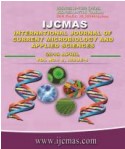


 National Academy of Agricultural Sciences (NAAS)
National Academy of Agricultural Sciences (NAAS)

|
PRINT ISSN : 2319-7692
Online ISSN : 2319-7706 Issues : 12 per year Publisher : Excellent Publishers Email : editorijcmas@gmail.com / submit@ijcmas.com Editor-in-chief: Dr.M.Prakash Index Copernicus ICV 2018: 95.39 NAAS RATING 2020: 5.38 |
Fifty cotton genotypes were investigated for variability and genetic divergence regarding yield related attributes, seed cotton yield and fibre quality traits using principle component analysis. Eleven traits viz., days to flowering, plant height (cm), no of sympodia/plant, no of bolls, boll weight (g/plant), seed cotton yield (kg/ha), Micronnaire value, % Span length, Uniformity ratio, Bundle strength (g/tex) and Elongation ratio were recorded for the germplasm accessions. Maximum variation of about 17.0% CV was observed for the traits No of bolls, Micronnaire value and Elongation ratio followed by Plant height (16.4) and Seed cotton yield (15.23). The study of distribution of quantitative traits using skewness and kurtosis provides information about nature of gene action and number of genes controlling the traits respectively. The traits No of sympodia, No of bolls, Seed cotton yield, Micronnaire value, Bundle strength, Elongation ratio were found to possess positive skewness resulting in complementary gene interactions. Regarding kurtosis, the traits No of bolls, boll weight and seed cotton yield were exhibited a normal distribution. Principal component analysis was utilized to examine the variation and to estimate the relative contribution of var¬ious traits for total variability. In the current study, Out of Eleven principle components (PCs), five principle components revealed Eigenvalue >1 and 76.0% of cumulative variability for the attributes under examination. The PC1 and PC2 contributed towards 42% of cumulative variability. The attributes of significance depicted in PC I and PC II were seed cotton yield, no of bolls, no of sympodia, boll weight, micronnaire value and span length expressed great contribution towards cumulative variability. These attributes should have bestowed special emphasis for cotton improvement in future breeding program.
 |
 |
 |
 |
 |